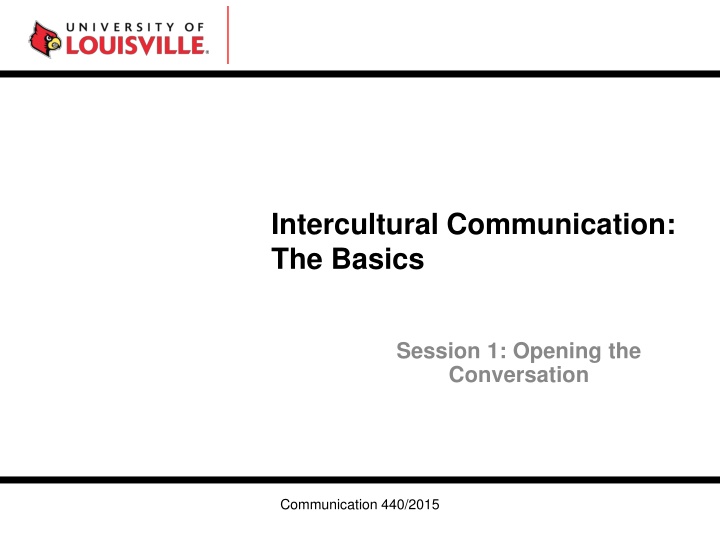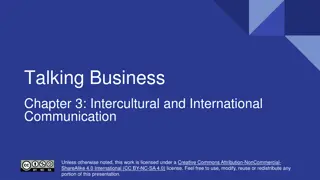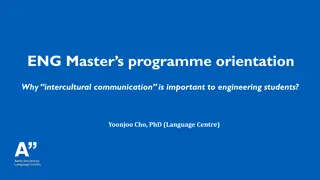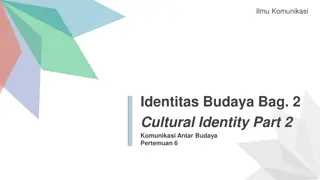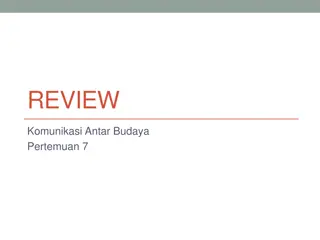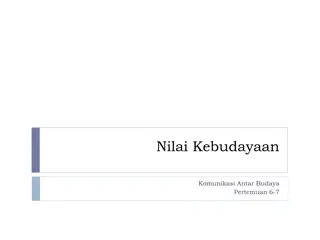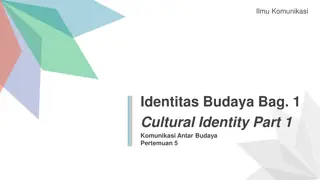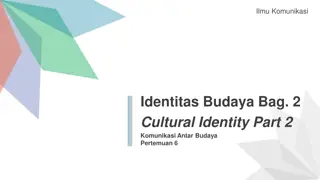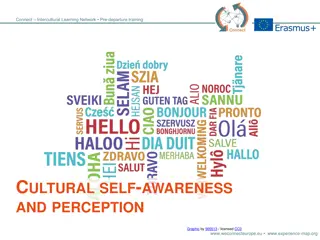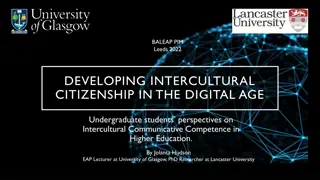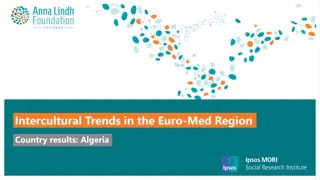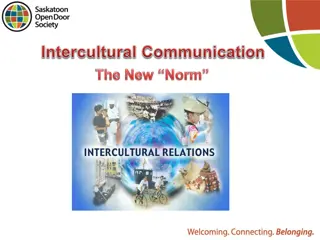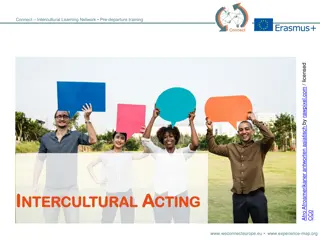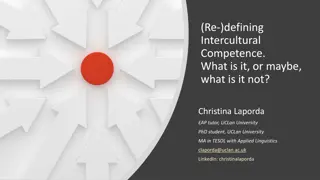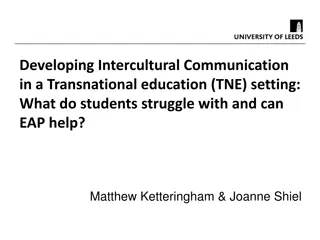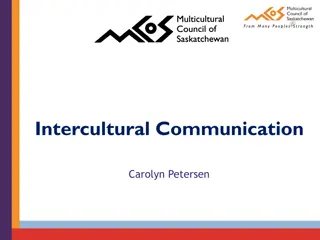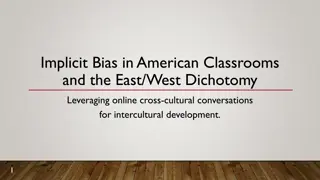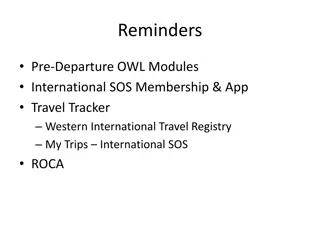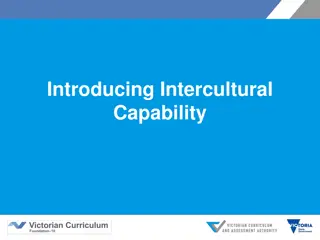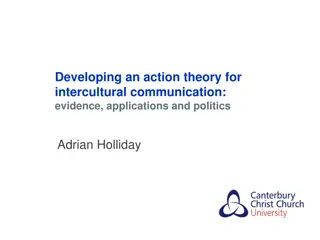Intercultural Communication Basics: Opening Global Perspectives
Delve into the fundamentals of intercultural communication within the context of globalization, exploring culture's significance, societal perspectives, and power dynamics. Uncover the diverse facets of culture as a contested space and a valuable resource in today's interconnected world.
Download Presentation

Please find below an Image/Link to download the presentation.
The content on the website is provided AS IS for your information and personal use only. It may not be sold, licensed, or shared on other websites without obtaining consent from the author.If you encounter any issues during the download, it is possible that the publisher has removed the file from their server.
You are allowed to download the files provided on this website for personal or commercial use, subject to the condition that they are used lawfully. All files are the property of their respective owners.
The content on the website is provided AS IS for your information and personal use only. It may not be sold, licensed, or shared on other websites without obtaining consent from the author.
E N D
Presentation Transcript
Intercultural Communication: The Basics Session 1: Opening the Conversation Communication 440/2015
Objectives Move from passive recipients to active participants of intercultural communication Introduce challenges and opportunities of intercultural communication in the context of globalization Define culture Understand how social location and standpoint shape perspective and experience Introduce intercultural praxis Communication 440/ 2015
Intercultural Communication in the Context of Globalization Globalization changes in intercultural communication engagement - Do you have examples of this? Technology connects lives in a global economy - How do you experience this? Gap between haves and have-nots is widening. - Is this evident where you live? Intercultural communication takes place in a context of political, economic, and cultural globalization History, power, and global institutions play key roles Communication 440 2015
What is Culture? High Culture Culture of the elite class i.e. Opera, ballet, literature Low Culture Culture of the working class i.e. Folk art, popular theater Popular Culture Culture of common everyday people i.e. TV, magazine, movies, fashion, music Communication 440/2015
Anthropologic Definition Culture is passed down from generation to generation through symbols . Culture allows us to make sense and understand the world. Culture allows us to express ourselves. When you share the system of meaning, you become part of the culture. Communication 440/2015
Culture as a Site of Contested Meaning Cultural Studies Definition Culture is not shared by everyone, but contested and negotiated. Focus on representations of class, race, gender, sexuality, and nationality in the media. Culture as an apparatus of power, system of domination. Culture is a site where power relations are negotiated. Hegemony : Domination through consent Communication 440/2015
Culture as a Resource Globalization Definition Culture is used as resource for economic growth in global trade (movies, music, etc.) Resource for political movement. Resource for educating people: literacy, health campaigns, etc. Resource for collective resistance and social change Communication 440/2015
Cultural Identity A situated sense of self that is shaped by our cultural experiences and social locations How do you define yourself in terms of cultural identity? Do you have multiple cultural identities? How does your cultural identity shape your perspectives, beliefs and relationships with others? Is the way you identify culturally related to issues of power? For example, dominant groups identities are often not as salient as non-dominant group identities Communication 440/2015
Positionality A term that describes how we are socially positioned in relation to each other. One s social location shaped by differences- -race, class, gender, sexual orientation, religion, nationality, and physical abilities i.e. I m a woman, of Mexican descent, upper class, and deaf i.e. I m a White American male who is in a committed relationship with another man, educated, from working class, and non-religious Communication 440/2015
Standpoint Theory Standpoint: A place from which to view and make sense of the world. Your positionality gives you a particular standpoint. Different realities depending on the position from which to view it. People with less power in society often have a fuller and more comprehensive view both the dominant and marginalized view. Communication 440/2015
Standpoint Theory and Positionality We may see, experience, and understand the world quite differently based on our different standpoints and positionalities . Knowledge about ourselves and others is situated and partial. Knowledge is always and inevitably connected to power. Oppositional standpoints can be formed to challenge and contest the status quo. Communication 440/2015
Ethnocentrism Ethno: group or nation Idea that one s own group s way of thinking, being and acting is superior to others. Ethnocentrism can result in dehumanization, prejudices, discrimination, conflict, and violence. Communication 440/2015
Intercultural Praxis Praxis: Action & Reflection A process of critical analysis, reflection, and action for effective intercultural communication in the context of globalization. To raise our awareness, increase our critical analysis, and develop our socially responsible action. There are six ports of entry: Inquiry, Framing, Positioning, Dialogue, Reflection, and Action. Communication 440/2015
Intercultural Praxis Communication 440/2015
Summary In this session, we addressed: 3 Definitions of culture: - Culture as shared meaning - Culture as contested meaning - Culture as resource Key concepts - Positionality - Standpoint theory - Ethnocentrism Intercultural praxis Communication 440/2015
